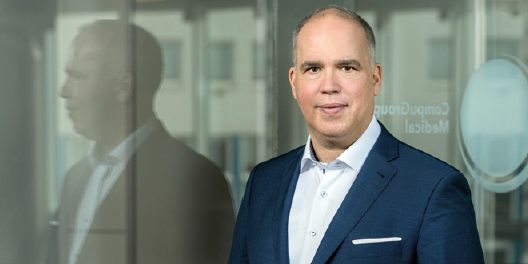Interview with Dr Dirk Wössner, CEO, CompuGroup Medical, Koblenz
The European: Dr Wössner, you became the Chief Executive Officer of CompuGroup Medical (CGM) in 2021, at a time when the company’s state-of-the-art software is supporting Covid-19 vaccinations worldwide. Even more than before the pandemic, the whole world is now calling for connections between people, facilities, and processes for an optimised impact of diagnoses and therapies. Is this pandemic a real breakthrough for digitalisation in the health care sector in Europe and worldwide?
Dirk Wössner: Absolutely. This pandemic has made us aware of how crucial well-functioning and efficient healthcare is, as well as the opportunities that arise from digitalisation of processes, data processing and information exchange. Many services were useful before the pandemic, but since the worldwide spread of COVID-19, there has been a big leap forward and everyone has seen and experienced video consultations, telemedicine, personal health records, digital vaccination records and so on.
The European: CGM has benefited greatly from this dynamic growth of digitalisation. But at the same time, medical care has only benefitted to a limited extent so far from information technology and telematics. The greater part is yet to come. What are your value creating goals?
Dirk Wössner: There are indeed many growth opportunities driven by digitalisation, which is only just beginning to develop its strengths in many areas.
We always focus on the so-called “patient journey”, i.e. the course of treatment for a patient, for example from the family doctor’s office to the hospital, the rehabilitation clinic, etc. Often, many care givers are involved in one healthcare process and our goal is to support them by synchronising all the processes.
The European: Thus, you are enabling the patients themselves to participate.
Dirk Wössner: Indeed, you are right. We are also fostering learning from data and providing more and more clinical decision support for all those involved in care processes.
The European: Many countries have already passed laws to further digitalise their healthcare sectors. Do states or governments need to do more to nudge the process forward?
Dirk Wössner: Numerous governments have recognised the urgent need for action and have adopted large investment programmes, worth billions in some cases – for example, in Germany with the “Krankenhauszukunftsgesetz” (Hospital Future Act) and in France with the “Ségur de la Santé” package of measures. All Member States of the EU should follow suit so that the European Union can become the global leader in the digitalisation of healthcare.
The European: Certainly, one of the major digitalisation projects in European healthcare is the German Telematics Infrastructure. What can you tell us about the status and future of this project in Germany?
Dirk Wössner: While in the past, the Telematics Infrastructure mainly involved access and administrative processes, it is now starting to support medical care itself. This includes a medication plan, emergency data set, physicians’ letters – real support for secure and coordinated healthcare. Within this project, our company is committed to creating a broad basis for a digitally supported patient journey. Hundreds of thousands of healthcare professionals and millions of patients will benefit from these achievements.
The European: Let me come to data security and turn to your conviction that digital health is a win/win situation, because secure data and secure digital technologies are key responses to sudden health threats. But these exchanges are not without risk and danger. They need to be ultra-secure, especially if data is exchanged across EU borders. Does data security hinder efficiency in your sector?
Dirk Wössner: Data security is of great importance and must be taken seriously. That is exactly what we do, and it is crystal clear that especially medical data must be protected strongly, which will also help people to look at these solutions optimistically. Also, the GDPR can help European companies in competing with ones from e.g. the US.
The European: CGM is reputed for its scrupulous observance of the EU Global Data Protection Regulations (GDPR)…
Dirk Wössner: …yes, for CGM, we can state that all medical data from patients in the EU will be processed only within the EU borders. Nevertheless, we find ourselves in a difficult area here. In Germany for instance, the premise of data economy still applies. At the same time, data is seen as one of the most important sources of future innovation. A little more openness in the – voluntary – utilisation of existing data would be desirable.
The European: Let me come to the end of our conversation and ask you to respond to the reactions from two readers of the latest edition of our magazine. One says: “My health has pre-eminence over data protection” and the other claims that: “my data is more important than health”. Would you be so kind as to give our readers your advice?
Dirk Wössner: Both positions are reasonable, and at CGM we are strongly convinced that data protection must always play an important role in any e-health solution. It is particularly important that everyone is responsible for his or her data and has the right to decide what it is used for. However, we believe that it is possible to protect both patients’ data and their health in equal measure. My advice is to encourage everyone to use an electronic health record for example. Health is everyone’s most valuable asset, and that is why CGM has always emphasised that no one should suffer or die because at some point medical information was missing. That is the crucial point where digitalisation can really make a difference.
The European: Dr Wössner, I thank you for this conversation and wish you and your company every success in making health care continuously more efficient.







